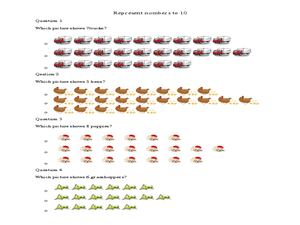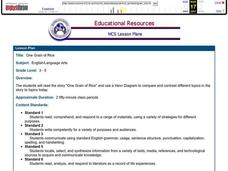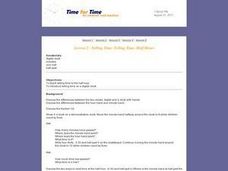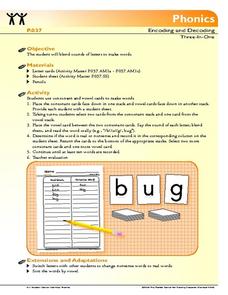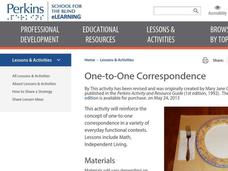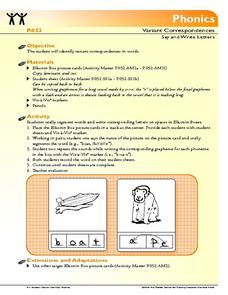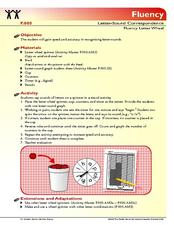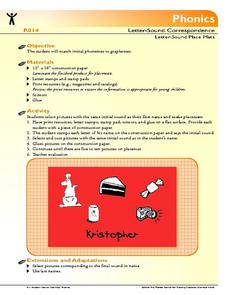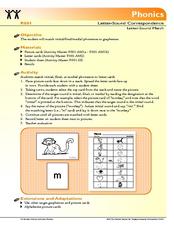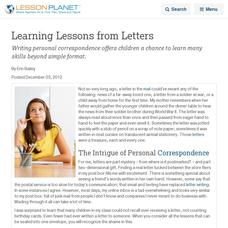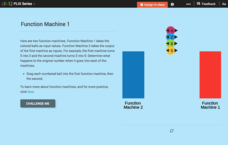Core Knowledge Foundation
First Grade Skills Unit 1
First graders participate in skills practice with 32 lessons focusing on sound-spelling correspondence—sound combinations, consonant digraphs, double letter sounds, tricky spellings, and words. Lessons begin with a warm-up, review and...
Common Core Sheets
Matching Clocks (Half Hour Increments)
First graders read an analog clock and then match it to the corresponding digital clock. Each clock tells time to the nearest 30 minutes.
Curated OER
Count the Pictures: Numbers to 10
Help your young learners master 1:1 correspondence by counting pictured objects, and to communicate answers in multiple choice format. Given a number, they choose which of 3 rows of objects is the correct match. Four opportunities to...
Curated OER
One Grain of Rice
Upper graders read the story One Grain of Rice, and use a Venn diagram to compare and contrast topics found in the story to current event topics today. Groups of three learners work together to create their diagram. The topics they must...
Time for Time
Telling Time: Telling Time: Half Hours
The whole class discusses the differences between the two clocks: digital and a clock with hands. They discuss the differences between the hour hand and minute hand. Students are taught telling time to the half hour. They are introduced...
Curated OER
Odd One Out
Which of these pictures doesn't belong? Based on the first picture in each row, learners circle the picture that doesn't rhyme with it. Then, they get printing practice with rhyming CVC words pie and cry by tracing an outline....
Curated OER
Odd One Out
Which word doesn't rhyme? As they practice vowel-sound recognition, scholars examine rows of familiar objects to determine which object doesn't rhyme. There are four rows here, each with a beginning image and three subsequent images....
Curated OER
Counting to 5
Tiny scholars count 5 lollipops by ones, filling in the blank in a sentence with the total amount. Have them color in the pictures to develop fine motor skills for writing. Useful notes for teacher about developing 1:1 correspondence and...
EngageNY
Correspondence and Transformations
Looking for a strategy to organize the information related to transformations? The materials ask pupils to identify a sequence of rigid transformations, identify corresponding angles and sides, and write a congruence statement. They...
Florida Center for Reading Research
Phonics: Encoding and Decoding, Three-In-One
Scholars use the provided pack of alphabet cards to construct basic CVC words, then write down each word they make in one of two columns. Column one is for real words and column two is for nonsense words.
Curated OER
Investigation - Distribution
Young scholars match match one notice with one child for all children in their group. They will determine the correct number of notices needed by for the children in their group. Through activities, students discover one-to-one...
Perkins School for the Blind
One-to-One Correspondence
Here is an interesting way to build concept understanding regarding one-to-one correspondence. Learners with visual impairments will use an array of everyday objects in context to foster an understanding of what one-to-one correspondence...
Florida Center for Reading Research
Phonics: Variant Correspondences, Say and Write Letters
Scholars sound out and write twelve different words. Using Elkonin boxes, pupils say the name of each picture, then write the letters that make each sound.
Florida Center for Reading Research
Phonics: Letter-Sound Correspondence, Letter-Sound Pyramid
This fun game is a way to help your littlest learners build strong phonological awareness. Scholars equipped with letter triangles, a stack of picture cards, and counters choose a picture card, say the name of the image, and attempt to...
Florida Center for Reading Research
Fluency: Letter-Sound Correspondence, Fluency Letter Wheel
Young scholars spin their way to letter sound fluency. While tomes, pairs spin a spinner and make the sound of the letter on which it lands. They add a counter to their cup for each sound they make correctly. At the end of the game,...
Florida Center for Reading Research
Phonics: Letter-Sound Correspondence, Medial Phoneme Spin
A collaborative activity challenges young scholars to match medial graphemes and phonemes. Pairs take turns spinning the spinner, naming the letter, and saying its name. They choose from a stack of cards with the same medial sound.
Florida Center for Reading Research
Phonics: Letter-Sound Correspondence, Letter-Sound Place Mats
Young scholars create personalized place mats as they learn about initial sounds. Using construction paper, they stamp their names using letter stamps. Scholars examine print resources and cut out pictures with the same initial sound as...
Florida Center for Reading Research
Phonics: Letter-Sound Correspondence, Letter Sound Match
Scholars match initial, medial, and final phonemes to individual graphemes. They pick a card, say its name, then find the letter that makes that sound. If the card is a monkey, the learner finds the letter m, matching the grapheme to the...
Florida Center for Reading Research
Letter-Sound Dominoes
What do dominoes and phonemes have in common? Quite a bit in this engaging phonics game! Each domino has a letter on one side and an image on the other. Everything you need is here; partners place the starting domino on the table then...
Curated OER
Learning Lessons from Letters
Writing personal correspondence offers children a chance to learn many skills beyond simple format.
Florida Center for Reading Research
Letter Recognition: Poetry Pen
It's always nice to have a great idea and all the tools to make it happen. The class can use these nursery rhyme and alphabet cards to teach each other letter recognition and letter sound correspondence. There is a full set of alphabet...
EngageNY
Applications of Congruence in Terms of Rigid Motions
Corresponding parts, congruent parts, congruent corresponding parts—what does it all mean? The resource challenges pupils to identify corresponding parts for pairs of figures. It uses examples of figures that undergo rigid...
Math Drills
Scary Multiplication
Boost multiplication fluency with a set of Halloween math worksheets, each with 60 one-digit multiplication problems. Learners multiply numbers two through nine.
CK-12 Foundation
Function Rules for Input-Output Tables: Function Machine 1
Challenge your classes to find the pattern of a double function machine. After recording the outputs of both machines, learners identify the pattern and the corresponding function. Both patterns involve adding/subtracting a constant.
Other popular searches
- One to One Correspondence
- One on One Correspondence
- One to One Correspondence Math
- 1 1 Correspondence Math
- One to One Correspondences




